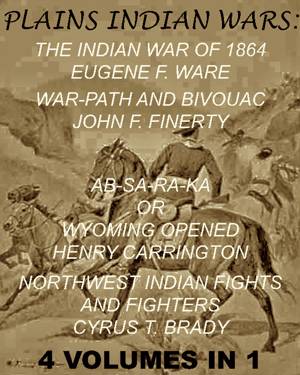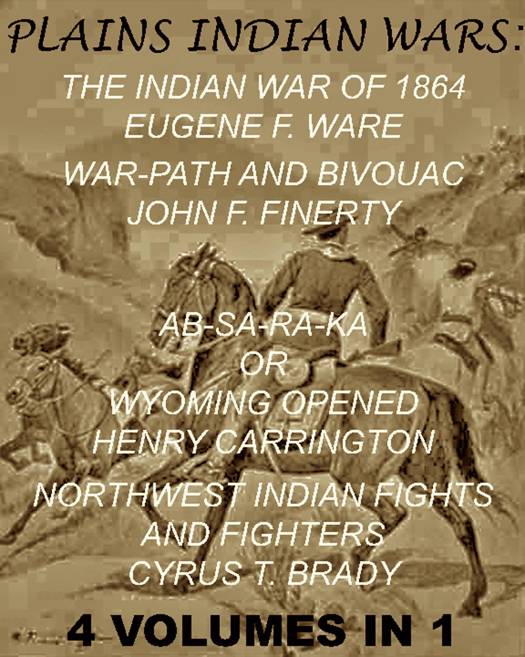
- Retrait gratuit dans votre magasin Club
- 7.000.000 titres dans notre catalogue
- Payer en toute sécurité
- Toujours un magasin près de chez vous
- Retrait gratuit dans votre magasin Club
- 7.000.000 titres dans notre catalogue
- Payer en toute sécurité
- Toujours un magasin près de chez vous
The Plains Indian Wars: Indian War of 1864, War-Path & Bivouac, Ab-Sa-Ra-Ka Or Wyoming Opened, & Northwest Indian Fights & Fighters" (4 Volumes In 1) EBOOK
Eugene F. Ware, John F. Finerty, Henry B. Carrington, Margaret I. Carrington, Cyrus T. BradyDescription
"The Plains Indian Wars: Indian War of 1864, War-Path & Bivouac, Ab-Sa-Ra-Ka, & Northwest Indian Fights & Fighters" (4 Volumes In 1) by Eugene Ware, John Finerty, Henry Carrington, and Cyrus Brady is an inside, eyewitness look at the Indian Wars that raged on the Plains from 1865-80. The 4 books show these bloody struggles from point of view of both the white man & Indian culture & tradition.
Book I, "The Indian War of 1864" by Eugene F. Ware is his account of duty during the Indian Wars portraying the harrowing life of the cavalry on the frontier. The Indians, with the encouragement of the Confederacy, tried to stop white settlement on their ancestral hunting grounds. In 1864, the Indian could still hold his own militarily; the repeating rifle, which gave the decisive edge to the white man, would not become common until 1870 & military supply was confined to ox-drawn wagons, as the Transcontinental Railroad would not be completed until 1869. His account of this struggle, the Indian way of life, & the overwhelming western emigrant flow illustrates the impeding doom of the various Plains Indian cultures that occurred in the 1870s.
Book II, "War-Path & Bivoauc" by John Finerty is an eyewitness account of the major Indian war on the Great Plains in 1876 and a smaller follow-up campaign in 1879 against Sitting Bull, the last Sioux holdout.
John E. Finerty, a reporter for the Chicago Times, accompanied an expedition to force the remaining Plains Indians onto reservations. Beginning in 1876, under General Alfred Terry, it was in this campaign that Custer suffered his famous defeat. Finerty gives a complete picture of campaigns & records the sights & sounds of Indian warfare. He also covers the 1879 campaign to force the surrender of Sitting Bull the last hold out from Custer's defeat.
Finerty's account of the Battle of the Rosebud which preceded the Custer massacre, pictures the spirit of resistance of the Plains Indians facing the destruction of their traditional way of life. The book gives a clear picture of Indian warfare & U. S. Army policy in this great Indian war.
Book III, "Ab-Sa-Ra-Ka" by Colonel Henry Carrington was written by Carrington & his wife Margaret, based on her daily journal & his records during his time in the Wyoming Territory. Margaret recorded her impressions of the scenery & inhabitants of "Absaraka," present-day Wyoming, Montana & western Dakota. She experienced the sequence of events & heightening tensions that led to the bloody day in December 1866 when Captain William Fetterman & his entire command were lured into an ambush by famed Sioux Indian chief Red Cloud & wiped out. The "Fetterman Massacre," caused by the captain's own recklessness, put Colonel Carrington's career at stake because of the army'sneed for a scapegoat.
A close up look at the life of troops, by the officer in charge & his observant wife. It portrays the undaunted spirit of the settler pioneers and the soldiers in one of the final struggles with the Plains Indians.
Book IV, "Northwest Indian Fights & Fighters: Chief Joseph and the Nez Perce War & Captain Jack and the Modoc War" by Cyrus T. Brady deals with 2 Indian Wars of the 1870's; the Nez Perce led by Chief Joseph & the Modoc led by "Captain Jack," so named due to his dress of cast off army clothing. Brady incorporates the writings on each war by actual eyewitness participants. In this way he adds muscle and sinew to the skeleton of the wars' events.
All four books in one inexpensive e-book--containing over 476,000 words & 72 illustrations originally contained in the four volumes--that gives a view of the Great Plains Indian Wars.
Spécifications
Parties prenantes
- Auteur(s) :
- Editeur:
Contenu
- Langue:
- Anglais
Caractéristiques
- EAN:
- 9781497799066
- Date de parution :
- 18-07-13
- Format:
- Ebook
- Protection digitale:
- Adobe DRM
- Format numérique:
- ePub







